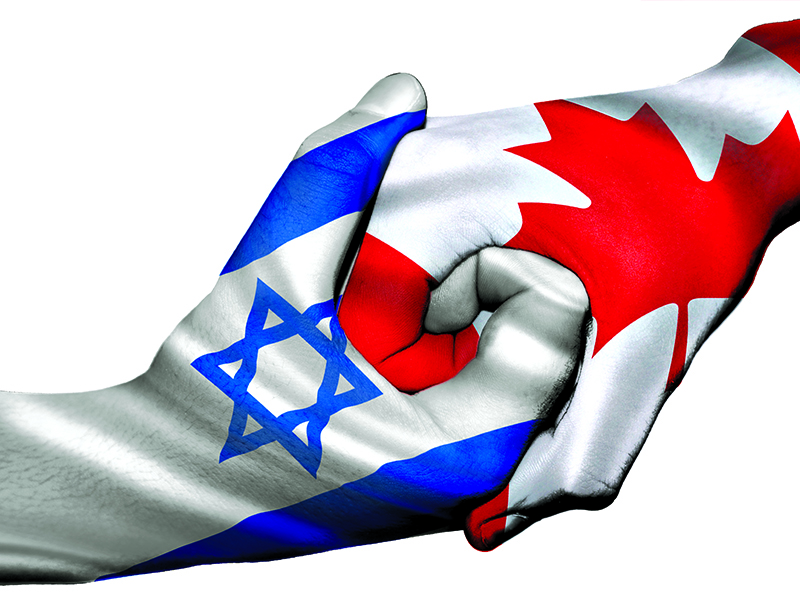As Canada turns 150 and Israel turns 70 this year, we can take a moment to consider what we’ve learned from the history of Israeli-Canadian relations. Two dynamics point to a friendship between the two countries: the longevity of the relationship; and its intense peaks, especially during the nearly decade-long tenure of former prime minister Stephen Harper’s government. Amidst all this has been a generally stated commitment to fair-mindedness that tends to characterize Canada’s approach to diplomacy: criticize and praise when each are warranted. Yet what is fair, of course, remains in the eye of the beholder.
The friendship between Canada and Israel began, one could say, even before the State of Israel declared its independence. As early as 1947, Canada was one of 11 countries that served on the United Nations Special Committee on Palestine (UNSCOP), which was tasked with making recommendations on the future of the area. UN Resolution 181, passed in November 1947, which resulted from UNSCOP’s recommendations, endorsed the idea of partitioning the area into two states. Canada voted in favour of the resolution and Israel declared independence in May 1948. And while Canada officially recognized the State of Israel in May 1949, Israel’s first attempt at gaining UN status failed: on that vote, Canada abstained.
There have been some notable times where Canada has punched above its weight on the global stage when it comes to Israel. The first was during the Suez Crisis of 1956. After foreign minister Lester B. Pearson’s diplomatic efforts bore no fruit, he led the UN’s first large-scale peacekeeping mission to the region. UNEF I, as the contingent was known, oversaw the withdrawal of British, French and Israeli troops from Egypt. In 1957, Pearson won a Nobel Peace Prize for his efforts. And while Canada’s active peacekeeping role has declined over the last two decades, Pearson’s move helped shape Canada’s national identity as a “peacekeeping nation.”
The second time Canada left a significant diplomatic mark was during the multilateral Arab-Israeli peace talks that emerged from the 1991 Madrid peace conference. Beginning in 1992, Canada led the working group on refugees. Though when Israel, along with Lebanon and Syria, failed to show up for a round of talks that Canada hosted in May 1992, foreign minister Barbara McDougall expressed her displeasure during an address to the Canadian Jewish Congress’s plenary assembly.
READ: THE CJN’S SPECIAL COVERAGE OF CANADA’S SESQUICENTENNIAL
Eventually pushed aside by the direct Israeli-Palestinian Oslo talks that started in 1993 – where the fate of refugees was considered, along with settlements, final borders and Jerusalem, one of the “final status” issues to be left for subsequent rounds of negotiations – the multilateral working groups stopped meeting by the mid-1990s.
The third time Canada left its mark was a decade-long phase – namely when prime minister Harper became what many considered to be Israeli Prime Minister Benjamin Netanyahu’s best friend on the world stage. The 2013 Negev dinner in Toronto honoured Harper for his longstanding support for Israel. “Israel has no greater friend than Canada,” Harper said at the time.
There have also been points of controversy – some where Canada was taken by surprise, others where Israel was. On two occasions – in 1973 and 1997 – Canadian passports were used by Mossad agents for undercover assassinations. In the first instance, a waiter in Norway was murdered in a case of mistaken identity following the Munich Olympics massacre. The second case involved an assassination attempt on Hamas leader Khaled Meshaal in Jordan. In response to the 1997 operation, Canada recalled its ambassador.
The 1982 Israel-PLO War in Lebanon, arguably the most controversial war of Israel’s history, even among its own citizens, saw harsh words from then-prime minister Pierre Trudeau. On June 12, Trudeau said that, “The death and destruction visited on innocent Lebanese civilians are unacceptable.” Israeli prime minister Menachem Begin had harsh words in his reply to Trudeau – so harsh that Israel’s ambassador to Canada almost didn’t deliver it.

And there was the career-hurting statement by Michael Ignatieff, during the 2006 Israel-Hezbollah War in Lebanon. Ignatieff, then running for the leadership of the Liberal party, said that Israel’s bombing of the Lebanese town of Qana, killing 28 civilians, was a “war crime.” Following a backlash, Ignatieff apologized.
Even in moments of political difference, expressed friendship appeared to run deep. In 1989, as the first Intifada was raging, Israeli president Chaim Herzog visited the House of Commons. Prime minister Brian Mulroney had this to say: “The values on which Israel was founded, and which have been tempered in the fire of her national experience, have never been tested more than at this moment. Canadians are deeply concerned because of their friendship for Israel and because of their profound conviction that human rights must be respected.” But amidst the critique, Mulroney went on to say that the “creation of the State of Israel is one of the epochal events of this century. For Canadians, Israel is not simply a place on the map. Israel is a tribute to the deep spiritual beliefs and the unfailing personal courage of a remarkable people. Israel is a monument to the indomitable spirit of man.”
And there have been awkward moments of over-exuberance that backfired, such as when Conservative leader Joe Clark announced, in April 1979, that if elected, his government would move the Canadian embassy to Jerusalem. Clark later walked back the pledge.
The emergence of the boycott, divestment and sanctions (BDS) movement over the last decade has seen a new shift in discourse from the Canadian government. Now, the federal government, and some provincial legislatures, have tried to position themselves within that grassroots debate. There was the February 2016 parliamentary motion opposing BDS, though a private member’s bill in Ontario targeting BDS was defeated in May of that year. Most recently, in a statement marking Israel’s independence day in 2017, Prime Minister Justin Trudeau said that, “Today, while we celebrate Israel’s independence, we also reaffirm our commitment to fight anti-Semitism and anti-Zionism.” It’s not the first time a Canadian prime minister has lauded Zionism; prime minister John G. Diefenbaker addressed the Zionist Organization of Canada in 1962, calling Zionism in Canada “a partnership among Jews and a fellowship with history.” But to weigh in on Zionism so directly as an ideology, as Trudeau did, may strike some as staking new ground.

In the international realm, namely the UN, Canada’s votes on resolutions related to Israel have been closely scrutinized. Canada’s voting record shifted towards Israel under prime minister Paul Martin, a pattern that intensified under Harper. This stance has not been without consequences. Canada’s failed 2010 bid for a UN Security Council seat was widely seen to be partly a result of its “unflinching support for Israel” at the UN, in the words of Globe and Mail commentators John Ibbitson and Joanna Slater. They wrote that Harper could either “acknowledge this rebuke from the global community and rethink how his government presents Canada to the world, or ignore it and accept an outsider status unique in this country’s history.”
Today, Canada and Israel enjoy a free trade agreement, signed by prime minister Jean Chrétien in 1997, making Israel only the third country (after the U.S. and, via NAFTA, Mexico) to enjoy such unfettered trade status with Canada.
Beyond the ties of clear and obvious friendship, are similarities in the two societies that are worth examining further. But some apparent similarities themselves are a point of debate among observers. There is the fact that both societies have attempted to forge a common national identity out of extensive immigration: Israel indeed sees itself as a project in “kibbutz galuyot” (ingathering of the exiles). And while Canada has come to terms, gradually, with its settler-colonial past, using that term to describe Israel is contentious among many.
Especially through the multiple school systems in various provinces, Canada serves as an example of the active promotion of two official languages; Israel’s separate school systems in some ways mirror this. But Israel’s relationship with bilingualism is much more fraught: unlike in Canada, where French immersion (meaning intensive French study for non-francophone students) is a popular choice, there are only a handful of schools across Israel where bilingual education is offered, and there are no Arabic-language universities or colleges (though there are some Arabic-language teachers colleges.) More controversially, a current bill making its way through the Knesset would seek to remove Arabic as an official language altogether. And then there is the question of liberal multiculturalism: can a Jewish state adopt the same kind of multicultural ethos that Canada has tried to forge? Should it?
Ultimately, any discussion of Canada-Israel relations also raises the question of what the role of friends should be. When Netanyahu said in 2015 that “Canada is one of Israel’s closest friends,” some observers took that to mean that Canada should give Israel carte blanche to pursue its current set of policies. Others suggest a tough-love approach. Some of these tough-lovers of Israel would presumably be represented among the two-thirds of Canadians who, when surveyed, thought sanctions on Israel would be “reasonable,” in light of the UN Security Council resolution condemning settlements, according to a 2017 EKOS poll.
Of course, the nature of Canada and Israel’s friendship – what it is and especially what it should be – is part of what animates the most lively debates in the pages of the Canadian Jewish News.









